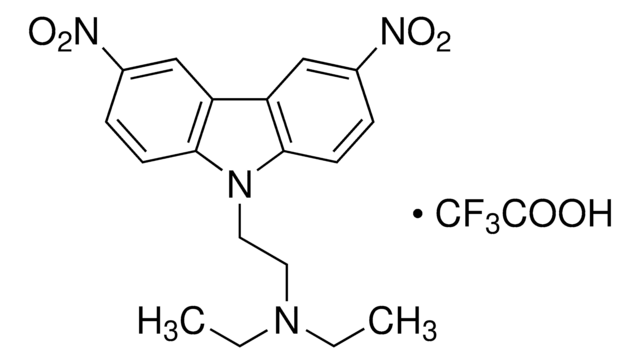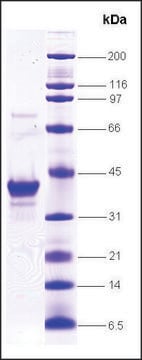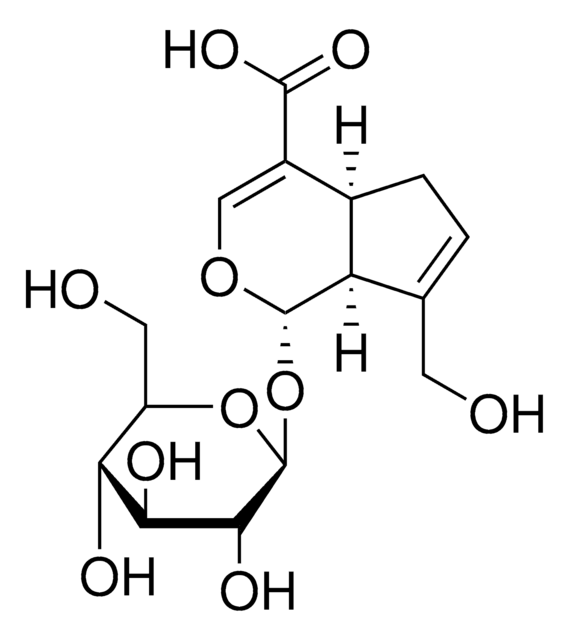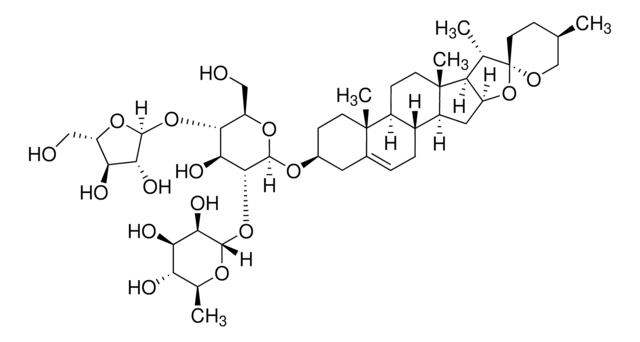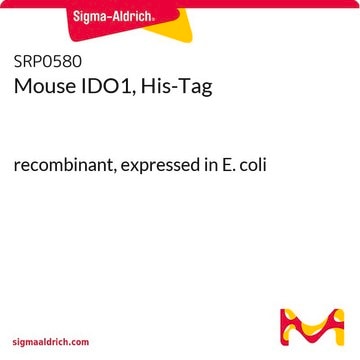SML2634
QX77
≥98% (HPLC)
Sinonimo/i:
N-(4-(7-Chloro-2H-benzo[b][1,4]oxazin-3-yl)phenyl)acetamide, N-[4-(7-Chloro-2H-1,4-benzoxazin-3-yl)phenyl]acetamide, QX 77, QX-77
Autenticatiper visualizzare i prezzi riservati alla tua organizzazione & contrattuali
About This Item
Formula empirica (notazione di Hill):
C16H13ClN2O2
Numero CAS:
Peso molecolare:
300.74
Numero MDL:
Codice UNSPSC:
12352200
NACRES:
NA.77
Prodotti consigliati
Saggio
≥98% (HPLC)
Forma fisica
powder
Colore
white to beige
Solubilità
DMSO: 2 mg/mL, clear
Temperatura di conservazione
2-8°C
Azioni biochim/fisiol
QX77 is a chaperone-mediated autophagy (CMA) activator derived from the atypical retinoid AR7 that activates CMA by antagonizing retinoic acid receptor-α (RARα) signaling. QX77 rescues defective trafficking & lysosomal localization of the CMA receptor LAMP2A in cystinotic Ctns-/- MEFs and CTNS-KO human proximal tubule cells (PTCs) by restoring Rab11 expression and Rab11-positive vesicles trafficking to the level seen in wild-type cells (20 μM, 48 hrs). CMA activation by QX77 treatment (20 μM, 5 days) also significantly reduces toxic α-synuclein (α-syn) accumulation in PD patients iPSCs-derived astrocytes with LRRK2 G2019S mutation.
Codice della classe di stoccaggio
13 - Non Combustible Solids
Classe di pericolosità dell'acqua (WGK)
WGK 3
Punto d’infiammabilità (°F)
Not applicable
Punto d’infiammabilità (°C)
Not applicable
Certificati d'analisi (COA)
Cerca il Certificati d'analisi (COA) digitando il numero di lotto/batch corrispondente. I numeri di lotto o di batch sono stampati sull'etichetta dei prodotti dopo la parola ‘Lotto’ o ‘Batch’.
Possiedi già questo prodotto?
I documenti relativi ai prodotti acquistati recentemente sono disponibili nell’Archivio dei documenti.
Jaime Anguiano et al.
Nature chemical biology, 9(6), 374-382 (2013-04-16)
Chaperone-mediated autophagy (CMA) contributes to cellular quality control and the cellular response to stress through the selective degradation of cytosolic proteins in lysosomes. A decrease in CMA activity occurs in aging and in age-related disorders (for example, neurodegenerative diseases and
Angelique di Domenico et al.
Stem cell reports, 12(2), 213-229 (2019-01-15)
Parkinson's disease (PD) is associated with the degeneration of ventral midbrain dopaminergic neurons (vmDAns) and the accumulation of toxic α-synuclein. A non-cell-autonomous contribution, in particular of astrocytes, during PD pathogenesis has been suggested by observational studies, but remains to be
Jinzhong Zhang et al.
Frontiers in endocrinology, 10, 21-21 (2019-02-19)
Cystinosis is a lysosomal storage disorder caused by defects in CTNS, the gene that encodes the lysosomal cystine transporter cystinosin. Patients with nephropathic cystinosis are characterized by endocrine defects, defective proximal tubule cell (PTC) function, the development of Fanconi syndrome
Jinzhong Zhang et al.
The Journal of biological chemistry, 292(25), 10328-10346 (2017-05-04)
The lysosomal storage disease cystinosis, caused by cystinosin deficiency, is characterized by cell malfunction, tissue failure, and progressive renal injury despite cystine-depletion therapies. Cystinosis is associated with defects in chaperone-mediated autophagy (CMA), but the molecular mechanisms are incompletely understood. Here
Il team dei nostri ricercatori vanta grande esperienza in tutte le aree della ricerca quali Life Science, scienza dei materiali, sintesi chimica, cromatografia, discipline analitiche, ecc..
Contatta l'Assistenza Tecnica.
